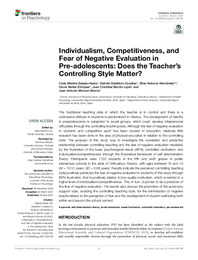Por favor, use este identificador para citar o enlazar este ítem:
https://hdl.handle.net/11000/31062Registro completo de metadatos
| Campo DC | Valor | Lengua/Idioma |
|---|---|---|
| dc.contributor.author | Salazar Ayala, Carla Mariela | - |
| dc.contributor.author | Gastélum-Cuadras, Gabriel | - |
| dc.contributor.author | Huéscar Hernández, Elisa | - |
| dc.contributor.author | Núñez Enríquez, Oscar | - |
| dc.contributor.author | Barrón-Luján, Juan Cristóbal | - |
| dc.contributor.author | Moreno Murcia, Juan Antonio | - |
| dc.contributor.other | Departamentos de la UMH::Ciencias del Deporte | es_ES |
| dc.date.accessioned | 2024-02-05T12:35:37Z | - |
| dc.date.available | 2024-02-05T12:35:37Z | - |
| dc.date.created | 2021-04 | - |
| dc.identifier.citation | Frontiers in Psychology Volume 12 - 2021 | es_ES |
| dc.identifier.issn | 1664-1078 | - |
| dc.identifier.uri | https://hdl.handle.net/11000/31062 | - |
| dc.description.abstract | The traditional teaching style in which the teacher is in control and there is a submissive attitude in students is predominant in Mexico. The development of identity in preadolescence is subjected to social groups, which could develop interpersonal difficulties through the controlling teaching style. Although the fear of negative evaluation in students and competitive sport has been studied in education, relatively little research has been done in the area of physical education in relation to the controlling style. The purpose of this study was to investigate the correlation and predictive relationship between controlling teaching and the fear of negative evaluation mediated by the frustration of the basic psychological needs (BPN), controlled motivation, and individualism/competitiveness through the theoretical framework of self-determination theory. Participants were 1132 students in the fifth and sixth grades in public elementary schools in the state of Chihuahua, Mexico, with ages between 10 and 13 (M = 10.51 years; SD = 0.66 years). Results indicate the perceived controlling teaching style positively predicted the fear of negative evaluation in students of this study through BPN frustration, that is positively related to low-quality motivation, which is related to a higher level of individualism/competitiveness. This, in turn, is proven to be a predictor of the fear of negative evaluation. The results also discuss the promotion of the autonomy support style, avoiding the controlling teaching style, for the minimization of negative results related to the perception of fear and the development of student well-being both within and beyond the school context. | es_ES |
| dc.format | application/pdf | es_ES |
| dc.format.extent | 11 | es_ES |
| dc.language.iso | eng | es_ES |
| dc.publisher | Frontiers Media | es_ES |
| dc.rights | info:eu-repo/semantics/openAccess | es_ES |
| dc.rights | Attribution-NonCommercial-NoDerivatives 4.0 Internacional | * |
| dc.rights.uri | http://creativecommons.org/licenses/by-nc-nd/4.0/ | * |
| dc.subject | self-determination theory | es_ES |
| dc.subject | social interaction | es_ES |
| dc.subject | needs frustration | es_ES |
| dc.subject | controlled motivation | es_ES |
| dc.subject | pre-adolescent | es_ES |
| dc.title | Individualism, Competitiveness, and Fear of Negative Evaluation in Pre-adolescents: Does the Teacher’s Controlling Style Matter? | es_ES |
| dc.type | info:eu-repo/semantics/article | es_ES |
| dc.relation.publisherversion | https://doi.org/10.3389/fpsyg.2021.626786 | es_ES |

Ver/Abrir:
2. Artículo.pdf
288,05 kB
Adobe PDF
Compartir:
 La licencia se describe como: Atribución-NonComercial-NoDerivada 4.0 Internacional.
La licencia se describe como: Atribución-NonComercial-NoDerivada 4.0 Internacional.
.png)